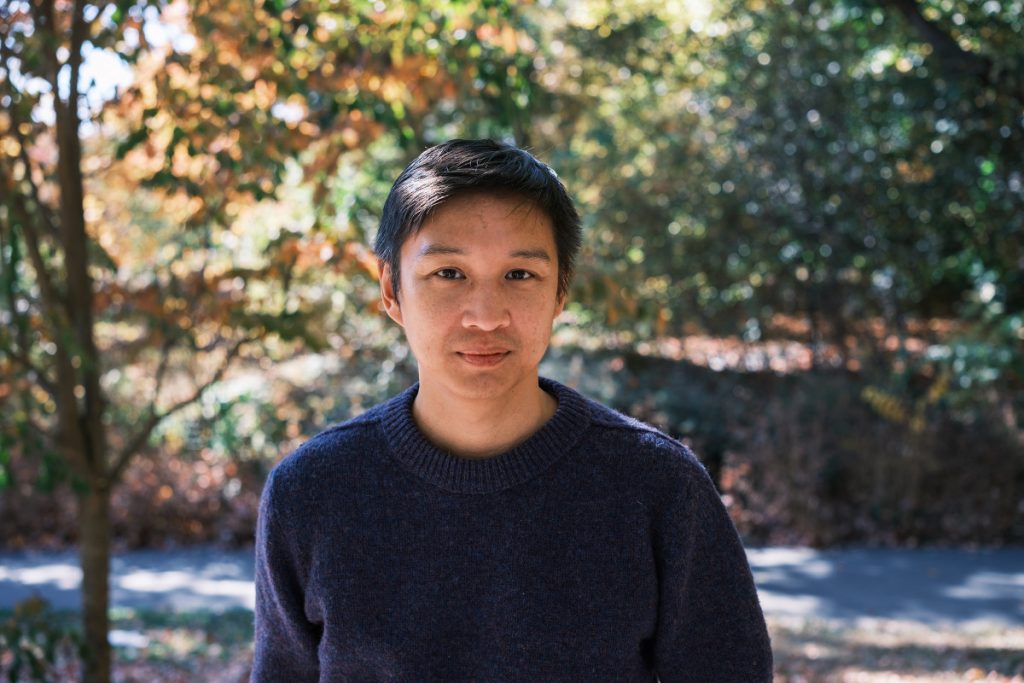
Susie Anderson
Staff writer
When Kevin Nguyen titled his sophomore novel Mỹ Documents — with a diacritic on the “y” to read “Mỹ,” the Vietnamese word for “American” — he anticipated pushback.
“I think I wanted to see if I could get away with a Vietnamese word in the title,” Nguyen said. “Would my publisher fight me on that? And they didn’t fight me at all. They loved it from the beginning.”
The subtle linguistic play sets the tone for a novel that is both satirical and sobering. At 3:30 p.m. today in the Hall of Philosophy, Nguyen will discuss his book that explores the cruelties and mundanities of racism in a portrait of American ambition, uncertainty and family for the Chautauqua Literary and Scientific Circle.
Nguyen found inspiration for the story from a glaring omission in his education.
“In either middle school or high school, we did an entire year about World War II, and Japanese American incarceration did not come up once,” Nguyen said. “Not even for one day or one hour.”
Following the attack on Pearl Harbor and the rise of anti-Japanese sentiment in World War II, Executive Order 9066 forcibly relocated and incarcerated over 100,000 Japanese Americans into internment camps. Nguyen’s novel blends themes from Japanese American internment camps, the Vietnam War and modern-day immigrant detention centers in crafting his near-future American novel.

Inspired by real-world events, Mỹ Documents follows four Vietnamese American cousins whose lives are upended after a coordinated series of terrorist attacks on U.S. soil. The government responds with the American Advanced Protections Initiative (AAPI) — an acronym shared by the community it targets, Asian American and Pacific Islanders — which leads to the creation of modern-day internment camps for Vietnamese Americans.
For Nguyen, even when writing a book eventually characterized as science fiction or speculative fiction, he wanted to ground the work in reality.
“I did just try to imagine as an exercise, ‘OK, if there were some form of internment today, what would it look like?’ And I realized it would look a lot like contemporary migrant detention,” Nguyen said.
Nguyen made a point of highlighting both the horrors and humanity inside and outside internment camps in his novel.
“I think it’s impossible for humans to not make culture at all times. I find that resilience quite fascinating and remarkable,” Nguyen said. “… It was sort of in the margins of a lot of the books I was reading about Japanese internment camps. Those textures were something I felt I could explore more meaningfully in a novel.”
Nguyen is the features editor at The Verge and previously served as a senior editor at GQ. With stories about ICE and the Department of Homeland Security crossing his desk, world-building details he once thought were too on-the-nose when he began writing in 2018 — such as the AAPI euphemism — have become eerily prophetic.
“In an earlier draft, the government was using social media to track people down. It’d be very imprecise, and the wrong people would be sent to detention camps just based on their social media posts,” Nguyen said. “Now, ICE is doing that.”
Although Nguyen’s initial dystopian imaginings have proven disturbingly prescient, his novel navigates levity alongside horrors. At a time filled with questions, Nguyen’s novel offers a point of exploration rather than a pragmatic solution.
“Art can definitely encapsulate the moment or feeling or movement, but I think art is doing something very different than trying to solve a problem,” he said. “I think that art that is trying to solve a problem is not very good art.”
Rather than offer clear ideas and solutions as he might in journalism, Nguyen leaned into the power of fiction as a messy tool of storytelling; one that raises questions instead of neatly answering them.
“A lot of the things that seem from the outset morally, really bad or morally, really good, by the end, I think everything is muddier and messier,” Nguyen said. “Maybe this is not the kind of fiction everyone wants to read. Some people like things with clear arcs and clear messages and clear takeaways. That’s just not what this book is.”
Despite the book’s heavier themes — state violence, displacement and institutionalized racism — Nguyen uses humor as both shield and scalpel.
“I find art stronger when it has a good sense of humor,” Nguyen said. “I think humor is a tool in the book to make some of the heavier themes in it a little more digestible — but also, I just personally like things that are funny. I hope that a reader that feels that way, too, will hopefully pick up the book.”
Mỹ Documents continues the thread Nguyen started in his debut novel New Waves, which tackled relationships, technology and alienation in the digital age. But his latest work broadens the scope and deepens the questions: What does it mean to be American? Who gets to decide? And what happens when the government redraws that line?
Rather than offer easy solutions, Nguyen encourages readers to sit with more uncomfortable or complex realities.
“I think a lot of great comedy comes from examining things that hit the critical, the ironic, or the unusual,” Nguyen said, “and bend your brain a little bit.”
Nguyen said that beyond raising awareness of the existence and persistence of injustice on American soil, from Japanese internment to current crises, he hopes that Mỹ Documents prompts investigation into one’s past to look for guidance for the future.
“I think we should be questioning our memory of history, our parents’ memory of history and our grandparents’ memory of history,” Nguyen said.




